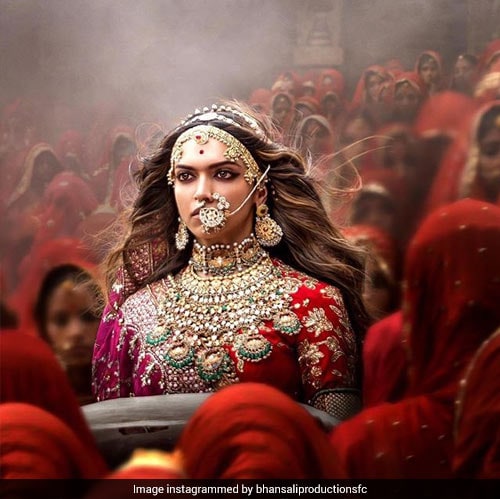
No person in their right mind can deny the power, reach and influence that Bollywood wields in our country. It is for this reason that a movie as thoroughly mediocre as "Padmaavat," or Padmavati, as the stoutly rebellious among us continue to call it, can have the country's collective panties in a twist, in one way or another, both before and after its release. Everyone and their Facebook friend has had something to say about the beleaguered film and the controversies shadowing it. But among the sea of bouquets, brickbats and resolutions to watch or not watch the film, depending on which side of the Karni Sena spectrum you fall on, there was one very pointed, very troubling criticism levelled at the film.
And thankfully, for once, someone from within the utterly sycophantic, eager-to-please, Bollywood has spoken up and against the very perplexing problem within "Padmaavat."
In an open letter to Sanjay Leela Bhansali published in The Wire, Swara Bhasker excoriated the film with excruciatingly detailed and unassailable arguments against the way it portrays jauhar, the Hindu custom of self-immolation (largely by women) to evade enslavement after war, that dates back to the 8th century, and gained massive popularity among Rajput royals in the 13th and 14th century while battling Mughal rulers.
Swara's contention is that the movie reduces not just its female lead, but all the women watching it, to little more than their vaginas, by glorifying death as a more noble (and romantic) pursuit than exercising their right to live, minus the penis of their lives. There is one particularly revolting scene in the movie where a misty-eyed Deepika Padukone with her practised-to-perfection tragic half-smile seeks permission from her husband to commit suicide through jauhar, but not before delivering a painfully long speech about the war between truth and lies, and morality and immorality, before concluding that collective self-immolation was the only way to truth and righteousness.

There's nothing wrong with Deepika's character thinking that way. It would be decidedly strange if a 14th century fictional (cannot emphasise this enough) Rajput queen was to suddenly launch into a speech about how the women in question should adopt whatever means necessary, and employ any tools at their disposal, to escape their fiery fate. The character, of course, thinks that sati is the honourable thing to do. She belongs to a fictional world of seven centuries ago.
The uncomfortable and more loaded question to ask is: why does the director, and his team, who exist in today's day and age, seem so preoccupied with glorifying it as a righteous choice? Surely there are ways to tell a story without tainting its entirety with the motivations of its character? Perhaps it is Bollywood's obsession with heroism that makes it so difficult for it to limit the emotions of leading actors and actresses to the characters they portray. If the stars, with their massive followings and god-like levels of hero-worship, are espousing an emotion, it must be virtuous and worthy of admiration. Never mind the repercussions of the disturbing messages they're helping perpetuate in the time period they currently straddle.
Swara, in a cutting comparison, contextualises the romanticisation of jauhar in "Padmaavat" by elaborating on the horror of jauhar-like assisted and voluntary suicides in more recent Indian history in her open letter. "During India and Pakistan's bloody Partition some 75,000 women were raped, kidnapped, abducted, forcibly impregnated by men of the 'other' religion. There were numerous instances of voluntary and assisted suicides by women, in some cases husbands and fathers themselves beheaded their wives and daughters before men of the 'other' religion could touch them," she wrote. "This is among the darkest periods of Indian history and ought to be remembered with shame, horror, sadness, reflection, empathy, nuance; not with thoughtless sensational glorification."

Swara Bhasker's meticulous open letter was possibly the most thoughtful, balanced and honest critique of the film, pointing out some deeply troubling issues with the way the film has been written and shot. At a time when the world deliberates over fundamental problems within the continued treatment of women in society, with movements like #MeToo gaining global momentum, these are important questions to ask and answer by the powers steering powerful and opinion-shaping content in pop culture. Is it really so unimaginable that the indulgent portrayal and, by extension, implied endorsement of suicide-to-protect-honour message of "Padmaavat" is exactly the kind of approval a would-be honour killer needs to justify his decision to kill a hapless daughter or sister who had the temerity to fall in love with a person from the "other" religion or caste?
But social media doesn't have time for such contemplative questions. Instead, in keeping with its grand tradition of missing the point, it completely ignored what Swara was trying to say, choosing, instead, to latch on to the word 'vagina', swiftly branding her as a 'pseudo feminist' who will cry about 'everything'.
Basically, the usual bilge that accompanies anyone who has anything meaningful to say. Clearly, a depressingly large portion of the social media population functions on this premise: why exercise our grey cells when it is so much easier to pooh-pooh those that are choosing to use theirs?
Swara Bhaskar writes open letter to Sanjay Leela Bhansali, says after watching his Magnum opus she felt reduced to a Vagina only
— Deepika Bhardwaj (@DeepikaBhardwaj) January 28, 2018
Well that happens when feminists start thinking from vagina than brains. Every film should now be made with feminist principles so not to offend them.
Someone tell Swara Bhaskar that Khilji reduced Padmavati and other Rajput women to mere Vaginas and not SLB..
— Ekita (@LostByWaves) January 28, 2018
Padmavati is the tale of how Rajput women refused to be mere vagina..
Swara and her mate seems to have forgotten that "Padmavati is a work of fiction" and there were 100s of disclaimers put before/after/within the movie!
— Manmarziyaan (@noneofurbijness) January 28, 2018
Anyhow, I am fed up fake woke feminists trying to stir up shit, based on convenience!
1 An Open Letter To Swara:
— Rupali (@KrazyGal92) January 28, 2018
Dear Swara, This story dates back to about 700 years ago when women were confined to their homes, without much sense of the outside world..no phones, no internet, no means of communication with anybody. Once married, they no longer went to their parents
To time for wannabe online activists’ below average writing being endorsed by Lutyens’ land. I don’t care about flippant usage of ‘vagina’ to gain eyeballs on shoddy writings.
— Shubhrastha (@Shubhrastha) January 27, 2018
The conversation quickly devolved into arguments about honour and rabble-rousing, without even a cursory stop at the mainstay of Swara's letter, and problem with the movie-the loving lens through which the director (not the film's characters!) sees jauhar. Much like the title of Swara's open letter, the content of it was "reduced to a vagina" online. Several tweets couldn't see past Swara's public use of the word, which she addressed in a tweet posted this morning:
Funny that people cannot get over the fact that a woman said Vagina! Funny that in a 2440 word article making fairly comprehensible arguments they only remember the word Vagina!!! 🙄 So... Vagina vagina vagina vagina vagina vagina...............vagina vagina VAGINA!!!!! https://t.co/pVh7rskZHL
— Swara Bhasker (@ReallySwara) January 28, 2018
The fact that "Padmaavat" finally saw the blessed darkness of movie theatres a few days ago is undeniably an important moment for Bollywood, an industry that is increasingly under threat from fringe elements using it as a launching pad for the politics of ideology and asserting their power.
Even as the sane-minded and angry among us rejoiced its release, "Padmaavat" opened to lukewarm responses from critics and disappointed sighs (at best) and fervent eye-rolling (at worst) from most of the audience. None of which is unexpected for a Sanjay Leela Bhansali film. Most of us have come to accept, with resignation, that the days of deliciously layered characters like Nana Patekar and Manisha Koirala's in Khamoshi, and Rani Mukherji and Amitabh Bachchan's in Black are long over. Somewhere along the way, SLB took to distracting the audience with big, bigger, biggest sets and obscenely elaborate costumes, and overwhelming us with lavishly-mounted visually spectacular films that have little else to offer.
Which is fine.
Hey, if the best thing that can be said about a movie is that it put the Frida Kahlo-esque unibrow back on the beauty map, and is likely to serve as bridal inspiration for the coming few wedding seasons; that still makes it a more relevant film than most mega-budget Bollywood flicks.
But if the worst thing that can be said about it is that it benevolently glorifies horrifying practices like sati and jauhar, that's a very, very alarming problem that absolutely must be addressed.
Unfortunately, this time, social media is too impatient to dwell on the very fine, very important argument Swara Bhasker was trying to make. Slow clap, Internet, what a way to miss the point.
Track Latest News Live on NDTV.com and get news updates from India and around the world
